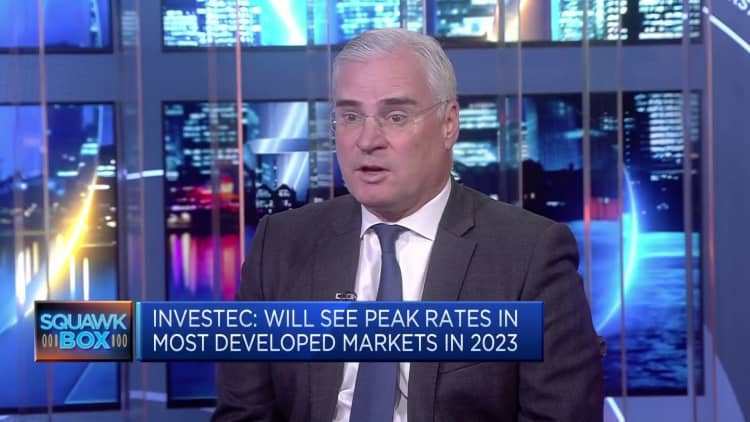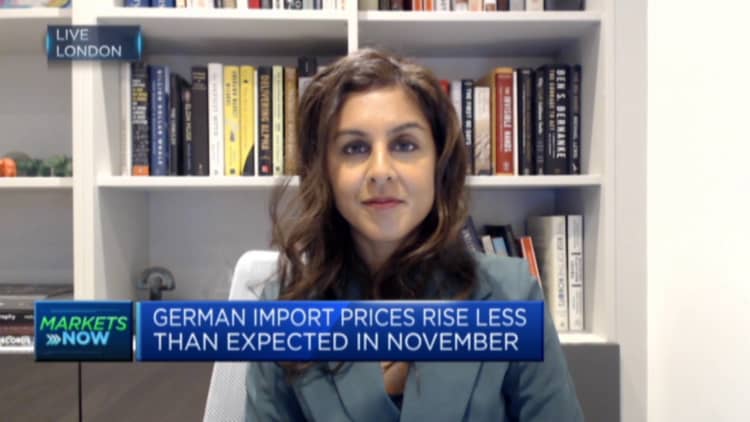Sopa Photos | Lightrocket | Getty Images
LONDON — U.K. GDP grew .1{b56f7a0c6479bc075d08fb7619591a4c4023144d1b4aceb7f3fe2776303deb2f} in November, according to new information Friday from the Business office for Countrywide Statistics, defying economists’ expectations and decreasing the chance that Britain entered a specialized economic downturn in the fourth quarter.
A Reuters poll of economists experienced forecast a .2{b56f7a0c6479bc075d08fb7619591a4c4023144d1b4aceb7f3fe2776303deb2f} contraction amid a bleak total picture for the British financial system.
The 3rd quarter of 2022 noticed a .3{b56f7a0c6479bc075d08fb7619591a4c4023144d1b4aceb7f3fe2776303deb2f} contraction, but immediately after a .5{b56f7a0c6479bc075d08fb7619591a4c4023144d1b4aceb7f3fe2776303deb2f} growth in every month true GDP in Oct and the shock .1{b56f7a0c6479bc075d08fb7619591a4c4023144d1b4aceb7f3fe2776303deb2f} progress in November, a specialized economic downturn (two consecutive quarters of destructive expansion) seems to have been averted for now.
“Output in purchaser-facing providers grew by .4{b56f7a0c6479bc075d08fb7619591a4c4023144d1b4aceb7f3fe2776303deb2f} in November 2022, subsequent advancement of 1.5{b56f7a0c6479bc075d08fb7619591a4c4023144d1b4aceb7f3fe2776303deb2f} (revised up from a growth of 1.2{b56f7a0c6479bc075d08fb7619591a4c4023144d1b4aceb7f3fe2776303deb2f} in our earlier publication) in Oct 2022 the premier contribution to expansion arrived from food items and beverage assistance things to do in a month where the FIFA World Cup started off,” the ONS reported in its report Friday.

The strengthen in solutions seemingly offset some of the negative influence of mass strike action across the U.K., significantly in the rail and postal sectors.
“When the immediate affect of the strikes by postal and rail staff can be noticed in the rail transportation and postal and courier things to do industries, we are not able to isolate the effects of these strikes from other elements throughout the wider overall economy,” the ONS explained.
“On the other hand, there was anecdotal proof to recommend this industrial motion experienced an effect throughout a large selection of industries, for example wholesale trade and manufacture and restore of jewelry.”
‘Economic contraction is underway’
Even with the good regular surprise, the ONS famous that GDP shrank by .3{b56f7a0c6479bc075d08fb7619591a4c4023144d1b4aceb7f3fe2776303deb2f} in the three months to the conclusion of November, and economists claimed the economic downturn might basically be delayed somewhat than averted.
“Present day facts can hardly disguise the likelihood that although recessionary circumstances may be shallow, an economic contraction is underway,” said Jeremy Batstone-Carr, European strategist at Raymond James.
“What is more, the consequences of the Bank’s financial tightening are nonetheless to feed by means of the financial state completely. Together with the corporation tax increase to 25{b56f7a0c6479bc075d08fb7619591a4c4023144d1b4aceb7f3fe2776303deb2f} and the expiration of the tax reduction on new investments, the financial state only stands to agreement even more.”
The Bank of England has projected that the U.K. financial system will experience at least a four-quarter recession, its longest on document.
“Output fell by .2{b56f7a0c6479bc075d08fb7619591a4c4023144d1b4aceb7f3fe2776303deb2f} suggesting that, although Q4 as a total may perhaps now demonstrate modest advancement, the outlook going ahead continues to be tough, particularly given that companies usage can be predicted to be curtailed as the charge of living disaster intensifies this year,” Stuart Cole, head macro economist at Equiti Money, told CNBC through email Friday.

“With the paying out enhance from the Earth Cup and Xmas now guiding us, industrial motion spreading and substantial tax rises owing to strike client pay back packets in April, the BoE’s forecast of a economic downturn seems established to be delayed alternatively than averted.”
The central bank’s intense financial plan tightening trajectory appears established to persist in the quick phrase as inflation ongoing to operate into double digits in November, albeit marking a slight drop from October’s 41-yr substantial.
Put together with a price-of-dwelling crisis brought about by soaring food stuff and electricity rates, widening industrial action and unparalleled stress on the country’s health services, shopper expending energy is not most likely to endure over and above the Christmas windfall. The increased charge of borrowing will very likely exert additional downward pressure on activity.
“Policymakers are eager to see heat taken out the overall economy because this will aid to deliver inflation down, which will at some point stop the constant rise in interest costs,” said Sophie Lund-Yates, direct equity analyst at Hargreaves Lansdown.
“In the long run, it can be pleasant to see the U.K. squeeze out 50 percent an ounce of economic expansion, but extremely authentic challenges persist.”
